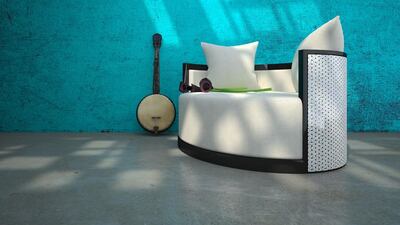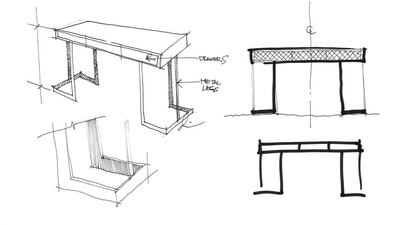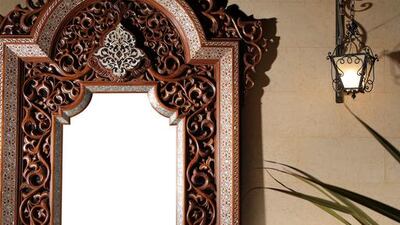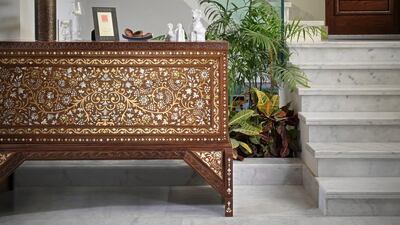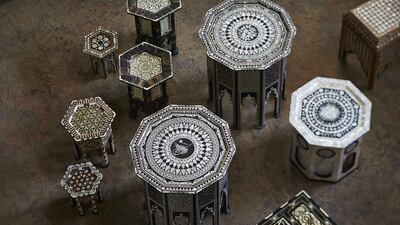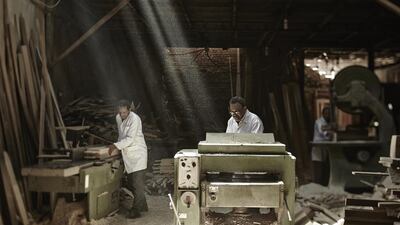At their heart, Etqaan's products are just about as traditional as can be. They draw on the age-old crafts of the Levant and North Africa, employing materials such as ebony, camel bone and mother-of-pearl, and they capture the romance of a bygone era – calling to mind tales of Scheherazade and the Silk Road.
But there are also undertones of modernity, something particularly apparent in Etqaan’s latest collaboration with the Abu Dhabi-based designers Fouad Mirza and Ritchie Nolasco. The NM Collection, which was unveiled last week, takes the hallmarks of traditional Arabic design – mother-of-pearl inlays, dark woods, majlis-style seating and mashrabiya-inspired motifs – and gives them a modern-day makeover, setting intricate side tables on stark, stainless steel legs, or injecting armchairs with unexpected proportion.
The desire to maintain the region’s crafts while creating furniture solutions that appeal to a broad cross-section of customers lies at the core of the Dubai-based brand. Etqaan represents a partnership between the Egyptian holding company Iwan Crafts and the Cairo-based Hossama, which has been creating top-quality heritage furniture since the 18th century, and has been involved in landmark restoration projects, from the Hanging Church in Old Cairo and Amr ibn Al As Mosque to Al Ghouri Market and the transformation of royal palaces into iconic hotels such as the Cairo’s Mena House Hotel.
These crafts are in need of being saved, says Tamer Zaki, the managing director of Etqaan. “It’s difficult finding that younger generation of craftsmen. In Cairo, we are developing something like an institute, to encourage craftsmen to come from all over the region – from Egypt, Syria, Morocco, Lebanon and wherever else – and develop these dying crafts. We hope to have a similar thing in the UAE, perhaps in a year or two. But it is very difficult, because the younger generation don’t want to spend the time required to perfect the job; they want to do something quickly and get paid for it. Finding people with the right mentality can be hard.”
The crafts employed by Etqaan – which translates in Arabic to mean “perfection” or “mastering” – are predominantly those traditional to Morocco, Egypt and Syria. Each has its own very distinct style, Zaki explains. In Morocco, for example, there’s less of a tradition of inlaying, and more focus on woodcarving. “In Syria, on the other hand, they have perfected the mother-of-pearl inlays. In Syria, you’ll see a lot of the mother-of-pearl, but you’ll barely see the wood and the beauty of the wood itself.
“In Egypt, we are in the middle. We always look at the balance between showing the beauty and grain and carving of the wood, which offers a lot of beautiful three-dimensional effects, but inside the carvings we introduce smaller inlays that also show the beauty of mother-of-pearl, so we have that balance between Morocco and Syria. Of course, each has its own unique beauty”.
Etqaan offers two lines – the first is the H or Heritage line which, as the name suggests, is far more classic and traditional. “H is where we include the whole concept of traditional pieces, with lots of rich materials, like ebony wood, walnut, mother-of-pearl, camel bone for the inlays and things like that. On the Heritage side, we are really focusing on presenting strong statements. It’s about perfect craftsmanship – it can take a month-and-a-half to two months to create the prototype for a single mirror.”
H Plus, on the other hand, focuses on melding the old with touches of the new, and is seeing the brand increasingly experiment with alternative materials such as stainless steel, marble, brass and glass, and partner with local and regional designers such as Mirza and Nolasco to develop a new type of aesthetic.
Whether they fall in the H or H Plus category, Etqaan’s pieces are strong and beautiful, but also, for the most part, unashamedly ornate – not the kind that will quietly disappear into your design scheme. But Zaki isn’t suggesting that anyone should go out and fill their home with these pieces. As the brand’s lifestyle imagery and visual communications demonstrate, a couple of these more traditional objects mixed into a contemporary design scheme can produce unexpectedly striking results. “Lots of people think modern is modern and classic is classic, but we show that you can mix the two.”
If anything, Zaki tends to advise customers against trying to cram too many of Etqaan’s creations into a single space – they should be viewed more as statements or accents. It’s a message that’s resonating with people across the region, regardless of their age. Because of the materials, time and skills required, the pieces are not cheap, but this isn’t proving to be an issue. The brand was officially launched in 2014, has an office and gallery space in the Dubai Design District, and is currently stocked in Cities Boutique, Arte Vivo and En Vogue in Dubai, Eclectic Gallery and the Al Manzool Showroom in Abu Dhabi, Cities in Riyadh, as well as a gallery in London and, imminently, a gallery in Hollywood.
“Because our designs are very young and fresh, we thought it might take time for people to get used to them. But we were lucky in that wherever we put them onto the market, people have responded very well.
“Lots of locals here in the region, and even in Cairo, particularly the slightly older generation, really have an eye for this type of design, and really appreciate and understand how a mirror can be sold for Dh25,000 to Dh30,000. They understand the materials and the workmanship.
“When it comes to the younger generation, lots of people understand interior design and furniture. But I’ve been amazed by how many young interior designers and young buyers, although they are so modern – in the way they think and the way they dress, for example – they still really appreciate a piece or two in this style in their homes. They know how uplifting it can be and how it can add value to the house. We don’t need to educate this market about design. If we do have to teach our clients anything, it is how to make these pieces work and what to put with them.”
sdenman@thenational.ae
